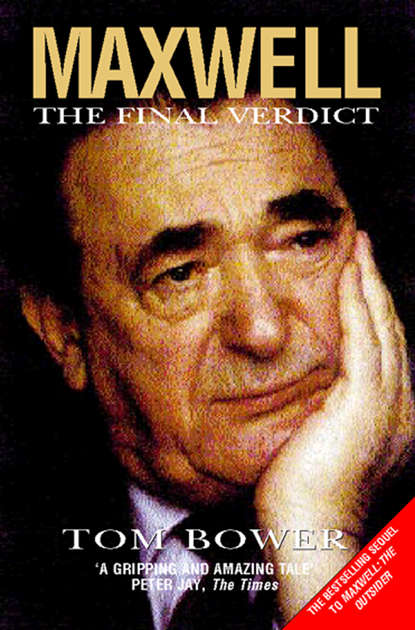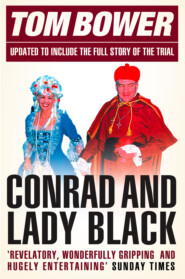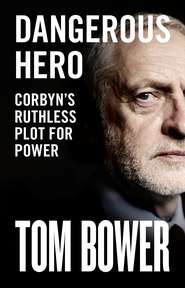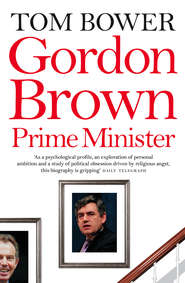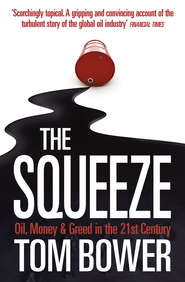По всем вопросам обращайтесь на: info@litportal.ru
(©) 2003-2024.
✖
Maxwell: The Final Verdict
Настройки чтения
Размер шрифта
Высота строк
Поля
For a moment, there was silence. None of the usual telephone calls interrupted Maxwell. ‘Very interesting,’ he murmured at last. ‘Has anyone else seen this?’
‘No,’ replied Woods, understanding the reason for the question. ‘If MCC’s share price falls, it will affect the private-side companies’ – many of whose loans were secured against MCC shares.
Again there was silence. Woods added, ‘I’m predicting a five per cent to eleven per cent growth rate – at best.’
Maxwell folded the paper: ‘I’ll get twenty per cent.’ Woods was dismissed from the room.
Days later, Maxwell borrowed a further £170 million from Lloyds Bank to part-finance his purchase of the Official Airline Guides. For Woods, it boded another tax nightmare, with more harmful consequences for MCC’s share price.
Ever since then, Woods’s fears had grown as he observed Maxwell’s efforts to prop up MCC’s profits. In October 1990 he offered Kevin an unorthodox solution. If MCC’s share price fell further, said Woods with an air of self-congratulation, the family would be able cheaply to buy (through the Mirror Group, still privately owned by Maxwell) the remaining 40 per cent of MCC shares owned by the public. ‘That’s an interesting idea,’ answered Kevin, recognizing Woods’s naivety about the state of the family’s finances. ‘I hadn’t thought of that.’ To his relief, the real crisis had not yet penetrated even into the inner sanctum.
Woods’s misgivings had been interpreted by Maxwell as evidence of disloyalty, the cardinal sin in the dictator’s eyes. Maxwell’s displeasure was aggravated when a secretary in Woods’s department was suspected of leaking to the satirical magazine Private Eye stories of a sexual affair between herself and Maxwell.
‘Sack her,’ ordered Maxwell, doubly outraged by the association with the magazine he had successfully sued for defamation. Woods refused. ‘She’s innocent,’ he insisted. But he was proved wrong. The secretary had forged letters and had invented the relationship. Woods was deemed to be a traitor. ‘Kick him out of his room,’ instructed Maxwell. Woods was removed from his plush office and dispatched to the equivalent of a dungeon, a shabby room in an outbuilding without a secretary. He hinted that he would resign his directorships, but Maxwell gambled correctly that his tax expert, like so many employees, would bear the embarrassment to avoid losing his high salary.
Of all those people in autumn 1990, few were as trusted by Robert and Kevin Maxwell as Larry Trachtenberg, an excitable, thirty-seven-year-old Californian international relations graduate who until 1985 had sought a PhD at the London School of Economics. During his period at the LSE, Trachtenberg had been renowned as the legman, the gofer amiably operating a photocopying machine late into the night to please a tutor, until he abandoned his studies to earn his fortune. In 1987, his babbling self-salesmanship had beguiled both Robert and Kevin Maxwell into believing him to be a talented investor and, keen to become rich, he had wilfully lent himself as the Maxwells’ tool. The American’s misfortune was his ignorance about the rules governing behaviour in the City. Untrained in finance, he casually assumed an expertise he lacked.
Almost every day, after the 7 a.m. ‘prayer meeting’ with his father, Kevin awaited Trachtenberg in his office. Together they agreed the implementation of Robert Maxwell’s orders: principally to use the £700 million plus in the pension funds to finance the empire’s difficulties. In Maxwell’s opinion, it was a stroke of genius to delegate to an underling under his own and Kevin’s supervision the negotiations being undertaken with banks over the use of the pension funds. By removing himself from personal contact, Maxwell could always deny any knowledge of any wrongdoing and maintain his worldwide profile as one of the globe’s media moguls. Concealing reality was, he knew, vital for survival.
Maxwell had begun using pension fund money as a temporary palliative in 1986. In that year he borrowed £1.5 million from MCC’s pension fund. In 1987 he borrowed £9 million. Both sums were repaid. His alleged legal authorization flowed from the ‘Powers of Investment’ clause in the fund’s deed of trust. But the clause stipulated that the trustees could only ‘lend money on such security as the Trustees think fit to any person except an Employer’. Accordingly, Maxwell was breaking the terms of the trust from 1986 onwards. Only the Publisher understood the irony of the presence in his wooden bookcase of a book called ‘Creative Accounting’ by Ian Griffiths. Chapter 4 was entitled, ‘How to pilfer the pension fund’.
In 1988, two of Maxwell’s financial ambitions coalesced. He wanted common management for the nine pension funds under his control – Mirror Group Pension Scheme, Maxwell Communication Staff Pension Plan, Maxwell Communication Works Pension Plan and six private pension schemes – and he aspired to own a bank. Both ambitions would allow him to authorize investments of other people’s funds for his own personal benefit. He prided himself on being a shrewd investor, in currencies and gilts as well as shares. In 1986, he boasted that he had earned £76 million by buying and then breaking up the Philip Hill Investment Trust, an operation which had earned him genuine acclaim from cynical City observers. His genius was that he had not paid a penny. Instead he issued 112.6 million MCC shares worth £306 million. He then sold off most of the Trust’s assets and used the cash to finance a buying spree in North America. Among the purchasers of the shares owned by the Trust was his own staff pension fund.
On Maxwell’s instructions, the pension fund bought from Philip Hill 12.4 million shares in Beechams, the pharmaceutical company. Three months later, just before a take-over bid for Beechams was announced, he ordered that the same shares be sold to MCC. When the news of the bid broke, the share price soared. Then, in March 1987, just before the end of the company’s financial year, MCC sold the same shares back to the pension fund and pocketed £17.4 million in profit. That ploy allowed Maxwell days later to boast that MCC had earned ‘record profits’. Only after his death would he be accused of receiving insider knowledge about Beechams, enabling him to manipulate the ownership of the shares and steal from the pension funds.
Over those ensuing years, Maxwell’s personal investments in banks – Ansbacher, Guinness Peat, Singer and Friedlander, the Midland and Robert Fraser – reflected his ambition to earn a fortune by controlling other people’s money. In his dream, he was emulating Lord Stevens, another newspaper baron and in Maxwell’s opinion ‘a spectacular success,’ who with Lord Rippon had transformed Invesco MIM into a £2 billion investment management fund. Hence in 1988 Maxwell established a new framework for the management of the pension funds. He had few qualms about his use of the funds. Soon after buying the Mirror in 1984, he had told Ken Angell, a former Mirror Group employee, ‘I own the pension fund.’ Angell, knowing that pension funds are vested in trustees on behalf of their beneficiaries, was surprised, but, when challenged, Maxwell logically explained his assertion. Since he personally owned the Mirror Group, and the pension fund effectively came under his control, he ‘owned’ the pension fund. To his delight, the funds were always in surplus.
The instrument for Maxwell’s control of the pension funds was BIM’s manager Trevor Cook, born in Northumberland in 1949, who had obtained a first-class degree in mathematics from Newcastle University. Appointed on 2 October 1985 as manager of the Mirror Group Pension Scheme, the inoffensive Cook was a pension fund administrator, not an accountant. Maxwell’s grounds for the selection were easily established: Cook willingly complied with his employer’s demands in return for a handsome salary. Having engineered an unusually close relationship, the Publisher insisted that he be notified in advance of all Cook’s movements. ‘Maxwell regarded his time as one hundred times more valuable than anyone else’s – so he wanted to talk at his convenience,’ recalled Cook, who made himself available to his employer’s telephone calls at all hours, knowing how much he relished disturbing his minions. Cook had proved himself malleable and easily impressed by Maxwell’s investment prowess, convinced that he ‘was a safe pair of hands’. Having asserted his ‘ownership’ of the pension funds, Maxwell directed the investments to suit his requirements. To Cook it appeared that the Publisher’s investments were astute and profitable, even if unconventional.
In March 1988, Maxwell had pooled four pension funds – benefiting at the peak 23,400 employees and worth over £700 million – into one Common Investment Fund (CIF). The management of CIF was entrusted to another Maxwell creation, Bishopsgate Investment Management (BIM), a non-profit-making organization. Both inventions had been established under the 1986 Financial Services Act with the permission of the Investment Management Regulatory Organization (IMRO), the government-appointed regulator. Given Maxwell’s history, John Morgan, IMRO’s director, should have been cautious. On his original written application, Maxwell had written that BIM was owned by the Pergamon Foundation Stiftung, a charitable body based in Liechtenstein. After reading the application, an IMRO official asked Cook for the Liechtenstein accounts. Cook asked Ron Woods, who in turn asked Maxwell. ‘Impossible!’ screamed Maxwell. ‘They can’t have them!’
‘They won’t authorize BIM without the accounts,’ pleaded Woods. But Maxwell was implacable – for good reason. The Foundation had no staff and no premises and produced no accounts to prove that it controlled any money. It was a legal fiction managed by his Swiss lawyers, who were paid to refuse answers to any questions. Maxwell was chairman of the trustees and, in his opinion, beyond mortal scrutiny. ‘There are no Liechtenstein accounts,’ Cook wrote to IMRO. Surprisingly, there was no reaction.
Maxwell’s escape from the potential trap had been effortless. Since the law required that BIM be owned by a registered charitable trust with proper accounts, he just invented one. The figment of his imagination was called the Maxwell Charitable Trust, its creation partly supervised by Deborah Maxwell, his legal adviser. Under the proposed structure, the Trust would control BIM, although neither actually employed any staff. The Trust was effectively just Robert Maxwell, without any trustees appointed by the pension funds, though including one trustee, David Corsan, a retired Coopers auditor who was also an IMRO director. BIM’s manager Trevor Cook and his staff were employed by Headington Holdings, a subsidiary of Headington Hill Investments. That extraordinary structure was ignored by the government’s regulator after the initial application was withdrawn, and on 6 April 1988 BIM received formal approval to manage the pension funds of over 20,000 employees from offices at 4/12 Dorrington Street, near Maxwell House. Cook was appointed the compliance officer, formally responsible for BIM’s obedience to the laws and for the company’s liaison with the regulatory authority.
Under BIM’s articles, Robert, Kevin and Ian Maxwell, the leading directors, wielded only limited powers, but inevitably those rules were ignored by Robert Maxwell, albeit unchallenged by Ron Woods, Trevor Cook, Robert Bunn (until his resignation in 1990) and the other directors. Unknown to them, in a legal ruse to protect himself in the event of any future inquiry, Maxwell had falsified the board minutes to appoint himself the sole arbiter of the company’s management. In the event, he decided on investments – sales and purchases – without reference to anyone else. His action mirrored MCC board minutes of November 1981 which permitted him to act as a ‘committee of MCC’s board of directors’, bestowing upon himself uncontrolled powers over the public company, including the right to be the sole signatory of cheques for unlimited amounts. Naturally, these changes in the running of BIM were kept a close secret. They existed only as a legal safeguard if trouble arose.
Maxwell quickly established a pattern of management of the pension funds. At BIM’s monthly meetings, religiously attended by Robert and Kevin and occasionally by Ian, the directors reviewed and approved BIM’s portfolio of investments. Cook and his deputy, Jeffrey Highfield, merely took care to monitor the minutes, acknowledging that the right to buy and sell shares belonged to the directors. Every month, they circulated a schedule of BIM’s portfolio of shares. So none of the Maxwells could ever be in any real doubt whether particular shares belonged to the pension funds or to their private companies.
In September 1988, Maxwell decided to establish tighter control over the pension investments. His excuse was the discovery of a fraud of £7,000 in the payment of pensions to former employees. A subsequent report by accountants concluded that the pensions administration was a ‘shambles’. Summoning Cook and Highfield, he announced that authority for the management of BIM and the CIF investments was to be vested in Robert Bunn, the accountant employed by his private companies. ‘Bunn will handle all relations with the brokers and investment houses,’ he said. ‘We are involved in a large number of take-overs and mergers. Bunn has better expertise. Bunn will have all the powers. Your responsibility will be solely BIM’s administration.’ At the end of their employer’s ten-minute speech, neither man protested.
But within weeks Highfield was complaining to Cook: ‘Bunn isn’t telling me about the actual investments.’ Cook remained silent, unwilling to question Maxwell’s edict that ‘We are ruled by IMRO, and we must not reveal price-sensitive information.’ Highfield was puzzled. Cook had already accepted another limitation upon himself. Three months earlier, in July 1988, Maxwell had decided that BIM and the pension funds would enter into a special and unusual relationship with yet another private Maxwell company, London & Bishopsgate Investments. LBI was the preliminary vehicle for Maxwell’s ambitions to control a bank. Not surprisingly, Cook did not understand the importance LBI would assume. ‘Go and talk to the LBI people,’ urged Maxwell soothingly, ‘and satisfy yourself of their competence.’ Cook had obliged and did not object to the relationship.
The creation of LBI was the direct consequence of Maxwell’s introduction to Larry Trachtenberg and another American, Andrew Smith, renowned as ‘a smooth New York computer jock’. Modelling himself on the Wall Street brokers in Tom Wolfe’s novel, Bonfire of the Vanities, Smith was a fast-talking, self-confident smoothie wearing braces over heavily starched shirts. His appearance and manner shrieked a dealer determined to make his fortune. In 1989, Smith, introduced to Maxwell by his father, a German banker, had professed that his hero was Michael Milken, the American arbitrageur and junk-bond specialist who by 1990 was on course for imprisonment.
Trachtenberg and Smith had met at the London School of Economics in 1985, both of them eager to join the rich in that booming era. Their initial ploy had been to exploit the exploding market for information and sell newsletters of financial and political analysis to banks, industrialists and investors. The information had been compiled by LSE students based on published sources. That easy money fed the two men’s ambitions. Technology was their answer. By 1987 when they met Maxwell, they had invented a computer system which, in theory, monitored all the international economies and markets to identify perfect investment opportunities before any mere mortals could do so. Calling themselves Global Analysis Systems (GAS), they were presented to Maxwell, an unrestrained admirer of technology, not as mere analysts but as investment managers. All they required was other people’s money to earn millions.
Entranced by their gimmick, Maxwell felt that they lacked gravitas. They needed the respectability that could be provided by employing in their firm an established personality in the financial community. That role, he believed, could be best performed by Lord Donoughue, a socialist academic who in the 1970s had served as a policy adviser to Harold Wilson before self-interest prompted him to switch ideologies in the 1980s to capitalism. In 1988, Bernard Donoughue, aged fifty-four, was employed as a director at Kleinwort Benson, the merchant bank, where he was responsible for research. Maxwell, the frustrated Labour politician, was keen to recruit any of Wilson’s team, and Donoughue leapt at the giant salary offered. He would be paid £180,000 per annum, plus £36,000 annual contribution towards his pension and an annual Christmas bonus of £200,000. In addition to that total of £436,000, Maxwell would provide a home in Westminster, close to parliament. An added attraction to LBI’s new, full-time executive vice-chairman (under Maxwell himself) was his belief that £300 million of Maxwell’s money was ‘sloshing about’ in various merchant banks waiting to be invested.
Donoughue’s income matched those of his two colleagues and co-directors. Trachtenberg’s initial annual salary in 1988 had been £80,000 but his income was boosted in the following year by a performance bonus of £125,000. Soon after its payment, Maxwell’s auditors realized that the bonus for all three directors had been paid on what were called ‘erroneous figures’, but it proved impossible for Kevin to overcome Donoughue’s stubborn objections and recover the money. That largesse, the loss of hundreds of thousands of pounds by sheer dilatoriness or negligence, contradicted the cultivated image of Maxwell as a ruthless cost-cutter and was a measure of the true state of the empire’s finances. Accordingly, in 1989, Trachtenberg’s income was consolidated at an annual salary of £185,000 plus £18,500 towards his pension, and Smith was paid £150,000 without any pension contribution. Trachtenberg was assured of a Christmas bonus of £125,000, Smith one of £200,000.
The trio, Trachtenberg, Smith and Donoughue, were formally embraced within Maxwell’s empire as directors of LBI – London & Bishopsgate Investments – with Robert and Kevin Maxwell. (Headington Hill Investments, the controlling company of all Maxwell’s private companies, bought a 60 per cent stake in GAS, which was then renamed London & Bishopsgate International Investment Inc. – LBII.) It was no coincidence that ‘London & Bishopsgate’ featured in the names of a growing number of Maxwell’s private companies. Among the twelve Bishopsgate companies was London & Bishopsgate Traders, London & Bishopsgate Holdings, London & Bishopsgate Group, London & Bishopsgate International NV and London & Bishopsgate International Management. All performed very different functions but, as Maxwell intended, the similarity of the names was liable to confuse outsiders. Adding to the confusion, some of the different London & Bishopsgate companies operated from the same premises and with the same staff.
Having established LBI as his new ‘investment bank’, with IMRO approval, Maxwell sought customers to establish his credibility for financial management. In spring 1988, he bought 25 per cent of First Tokyo Trust, a Scottish investment trust founded in 1980 which controlled £70 million of Japanese shares owned by institutions and private investors. Although Maxwell posed as a buyer in the name of London & Bishopsgate Holdings, a third of the money he used belonged to the pension funds.
Initially, Maxwell’s investment (codenamed ‘Setting Sun’) did not alarm Alan McInroy, the sober Scottish chairman of the First Tokyo Trust, who thought Donoughue ‘charming and competent’. Over the following two years, if any man other than the Maxwells could understand what was happening within First Tokyo, it was Donoughue. Donoughue presented himself, Larry Trachtenberg and Andrew Smith as investment geniuses. Their proposal to McInroy was to improve First Tokyo’s unspectacular performance. Instead of simply investing in Japanese shares, said Donoughue, the Trust should sign a contract to use LBI’s computer programme ‘Japan 60 GAS’ to anticipate the Japanese market’s performance and beat other investors.
Initially, McInroy was irked by Donoughue’s ambitions and opposed the plan, because it contradicted the Trust’s sober purpose, and anyway the transfer of the Trust’s powers to LBI would be expensive. But McInroy was soon outmanoeuvred. Exploiting his svelte patter and his political background, Donoughue had toured the institutions, winning their support for his idea. His management of the Trust was confirmed on 9 January 1989 when he joined First Tokyo’s board with two other Maxwell employees, George Willett, a taciturn stockbroker, and Robert Bunn. Just at the moment when Maxwell’s need for money – to buy MCC shares, to pump money into MCC by purchasing assets, and to pay for his accumulated losses since the stock market crash in 1987 – became pressing, McInroy had effectively allowed his control over the board’s six directors to dissolve, except in extremis by use of his casting vote. ‘I had no choice,’ he would explain. ‘The institutions supported Donoughue and Maxwell.’
Soon after, the Tokyo market fell sharply and Andrew Smith offered Maxwell a solution. It was called stock lending, a perfectly legitimate strategy invented in New York. Financial institutions and investors often required shares for a short period – overnight or a few days – to comply with securities laws or to cover speculative positions. Rather than buying the shares and incurring substantial costs, the investors borrowed them for a fee. In turn, to protect the registered shareholder from loss or theft, the borrower provided securities or cash worth more than the shares. Undertaken in this way, stock lending was risk-free.
It was in its pure form that, on 27 January 1989, Trachtenberg and Smith suggested to McInroy that First Tokyo could generate extra income at no risk by stock lending the shares in its reduced £60 million fund. Overcoming his initial reservations, McInroy agreed to a six-month trial. Unfortunately, however, he failed to ask a number of pertinent questions about the transactions, and most of all he failed to examine the contract between First Tokyo and LBI. He merely demanded that Morgan Stanley, the Trust’s bank which held the share certificates in its safe in London, should accept all the risk. Trachtenberg and Donoughue were told to obtain an undertaking to that effect from Morgan Stanley, whose vice-president Thomas Christofferson duly gave it. Trachtenberg and Donoughue then assured McInroy that the bank had agreed to be the guarantor, though the First Tokyo chairman appears never to have asked for written evidence. ‘That wasn’t my responsibility,’ he later explained.
Inevitably there was confusion about responsibility for the management of First Tokyo’s £60 million – confusion which was very much Robert Maxwell’s intention. First Tokyo had a contract with London & Bishopsgate International Investment Management, who were to manage the fund in accordance with the wishes of First Tokyo’s board of directors. LBIIM was owned by London & Bishopsgate Holdings, which in turn was owned by Headington Hill Investments, Maxwell’s private company ultimately owned by the Liechtenstein foundation. But it was the entirely distinct LBI which was undertaking the stock lending. This confusion was ignored by McInroy, not least because during the first year the profits seemed to exceed expectations.
McInroy’s legal advisers seem also not to have appreciated the deft self-protection of LBIIM’s contract with First Tokyo. While one clause at the top of the agreement permitted stock lending, another, much later clause allowed LBIIM to stock lend ‘in house’ for a ‘fair price’. Astutely, Maxwell and his cohorts had covered themselves in the event of future recriminations.
Unknown to McInroy, soon after the stock lending was approved Maxwell allowed Trachtenberg to use First Tokyo’s shares in an unauthorized manner. First Tokyo’s stock was being lent, not in an orthodox way on the open market, but to Maxwell privately, that is to London & Bishopsgate Holdings. And the collateral for the prime Japanese stock was not cash but MCC shares. To the Maxwells, the beauty of the operation was that First Tokyo’s shares were never sold, so preserving the myth that the fund was inviolate and untouched. The only risk was to First Tokyo’s innocent investors. The evidence suggests that by February 1990 Lord Donoughue ought to have suspected the unannounced use of those shares. In September of that year, Kevin would offer some of those First Tokyo shares to Julie Maitland of Crédit Suisse as collateral for the £50 million private loan.
By November 1990, as Maxwell vainly searched for relief from the recession and from the rising interest rates on his total debt of $3.5 billion, First Tokyo’s £60 million was only a small part of his requirements. For more than a year, he had also been stock lending pension fund shares using the technique proposed by Trachtenberg and Smith. During summer 1989, on the Maxwells’ instructions, Trachtenberg had negotiated the use of pension fund shares to raise cash from John Di Rocco, head of Lehman Brothers’ International securities lending department. To conceal the scheme, the contract signed by Kevin on BIM’s behalf was made complicated. Lehmans would be given shares from BIM’s portfolio, and in exchange would give Treasury bills to Maxwell. Maxwell would immediately sell the bills back to Lehmans, who would pay him in cash. The end result would be that Maxwell had cash and Lehmans had the security of the pension fund shares. In theory, the pension funds would retrieve their shares after buying back the Treasury bills. In the meantime, the impression was preserved that the pension funds still owned the shares unencumbered.
There was one major obstacle to overcome to obtain that cash. On each share certificate, the owner was registered as BIM. To use those pension fund shares, Maxwell needed to invent a cover story to explain his entry into such an unusual transaction.
The reason provided by Trachtenberg to Di Rocco was that BIM needed cash so that it could reinvest the money in shares which would produce higher returns than its existing portfolio, while simultaneously retaining the investment benefit of the shares it pledged. To Maxwell’s delight, Di Rocco accepted the business. Whether the banker realized by specific inquiries that BIM was the manager of pension fund assets would remain uncertain and be subsequently contested. But he and his superiors did realize that the arrangement was ‘purely a funding exercise’, and their suspicions ought to have been aroused because the circumstances were so unusual. It was unusual in two ways: first, the bank was to pay the cash into Maxwell’s private accounts; and second, neither Trachtenberg nor Andrew Smith was a director of BIM. Indeed, Trachtenberg said he represented LBIIM, which was acting as BIM’s agent.
There was one final hurdle. Before the pension fund shares could be used for stock lending, Trachtenberg required Trevor Cook’s consent. At the end of October 1989, after reading LBI’s terms for stock lending, Cook, BIM’s manager, signed an agreement. But that agreement – between BIM and LBI – was different from the contract with Lehmans signed by Kevin on LBI’s behalf, which was not for stock lending but for a loan.
To Cook, everything appeared normal. Working in an open-plan office in Dorrington Street with files marked ‘Stock lending accounts’, he and his deputy Jeff Highfield received monthly accounts from LBI recording the value of the stock lending: Cook in turn would bill LBI for the agreed 1.75 per cent fee. Cook’s willingness to be helpful made the Maxwells’ task much easier. He never asked to see the contracts.
Throughout 1989, with Cook’s agreement, Maxwell had also been personally borrowing increasing amounts of money from BIM, rising from £5 million to £22.5 million. To extinguish the debt, Maxwell ‘sold’ to BIM privately owned shares, but publicly he did not reveal the change of ownership. ‘We’ll always give the pension funds first refusal to earn profits from our share deals,’ Maxwell had told Cook. To the manager, the offer appeared generous. Apparently he remained unsuspicious even when Maxwell’s £22.5 million borrowing during 1989 cost the pension funds £510,000.
Having established Cook’s willingness to accept directives, Maxwell summoned him in January 1990. ‘I have decided it would be in BIM’s interest to buy more MCC shares,’ he said. ‘The price is certain to rise.’ Cook agreed, without questioning Maxwell’s misplaced confidence. BIM would pay £63.2 million for MCC shares owned by Maxwell personally. Cook not only agreed to the ‘offer’ but did not demand that the shares be registered in BIM’s name. Instead, the shares remained registered as Maxwell’s property, and he borrowed another £26 million of the pension funds’ money to finance MCC. Cook would subsequently explain, ‘I didn’t realize the ownership could be abused.’
That March, Maxwell called in Cook twice more. The price of MCC shares was falling despite his prediction two months earlier and he wanted to push it back up. ‘I think it would be beneficial for BIM to buy more MCC shares,’ he said. Two deals were concluded, which were to lose the pension funds £7.4 million. On the 20th, BIM purchased a call option on 10 million MCC shares through Sheinberg at Goldman Sachs. Days before the end of the financial year, BIM paid £20 million for the shares, £2.4 million more than their worth, to boost MCC’s price. On 29 March, BIM sold 7.9 million MCC shares through Goldmans. In the second deal, BIM bought a call option from Goldmans on a further 10 million MCC shares for £18.9 million. One month later, the deal was booked to BIT (Bishopsgate Investment Trust, the nominee company used by Maxwell to retain pension fund shares and cash). The option, exercised on 29 June, cost BIM £5 million.
On 31 March 1990, the end of the financial year, Maxwell’s debt to the pension fund was still £13.5 million, so to remove it from the annual accounts he repaid it. The following day, he withdrew the money again. Thereafter his use of pension fund money rocketed. By 29 June, he had taken £105 million from BIM. To settle that debt, he told Cook that he was ‘selling’ to the pension funds his private stake in Invesco MIM and 5.4 million shares in Scitex, an Israeli high-tech company producing imaging systems for the publishing industry. Maxwell had bought 9.59 million Scitex shares (after rights issue) in December 1988 for $39 million or £24 million. Their value would rise to $220 million. The shares Maxwell offered Cook represented three-quarters of his stake in the company and would be worth £102 million.
Cook accepted this ‘offer’ too. He listed the Scitex and Invesco shares as part of BIM’s management of pension funds and removed Maxwell’s private £105 million debt from the accounts. But he failed to register the shares officially in Israel as owned by the pension fund. This, he explained, was ‘because I had signed a personal agreement with Robert Maxwell that he was holding the shares on BIM’s behalf. Even worse, he did not secure possession of the share certificates.
Maxwell’s complete control over BIM and the pension funds was, to his and Kevin’s increasing irritation, not duplicated at LBI, where a crisis had arisen among the directors. The cause was Mark Tapley, recruited as the new managing director in January 1990. Clean-cut, honest and ambitious to make his fortune in London’s rollicking financial markets, Tapley had been employed in the 1970s at J.P. Morgan and had been lured to LBI from Lehmans by Smith and Lord Donoughue on a generous salary for a three-year contract plus bonuses.
Within days of his arrival, Tapley had become alarmed by LBI’s administrative chaos, for which he blamed Larry Trachtenberg. He was also unhappy with Andrew Smith’s exaggerated claims about past performance and who, moreover, appeared to be trading in shares in what Tapley considered an unacceptable manner. ‘That’s a conflict of interest,’ he cautioned Smith. Soon afterwards, Smith returned to New York to establish LBI Inc. with £10 million capital provided by Maxwell, continuing his collaboration with Trachtenberg and Donoughue, although the latter referred to the American as ‘Adolf Smith’. ‘We must get rid of Trachtenberg,’ Tapley told Donoughue. ‘We must get him out of LBI.’ But Donoughue did not respond. By then, he had become Kevin’s confidant and no week passed without his name featuring in the Maxwell son’s diary.
On 1 April 1990, glancing at LBI’s 1989 accounts, Tapley noticed the high fees LBI was earning from the stock-lending programme. ‘Where are these fees coming from?’ he asked Trachtenberg. The American only replied, ‘It’s all done through Morgan Stanley with their guarantee.’ Tapley’s curiosity was not satisfied. Searching through the records of the stock lending, he came across the name of Thomas Christofferson, of Morgan Stanley. Christofferson was grateful to Kevin for placing LBI’s custodian business with his bank. It was an easy source of income. Until November 1991, Christofferson would, on demand from either Kevin or Trachtenberg, innocently sign letters and release share certificates which diverted the shares belonging to First Tokyo and others.
Although Tapley noticed that Trachtenberg was telephoning Morgan Stanley and ordering them to pledge First Tokyo’s shares to other banks as formal stock lending, reading LBI’s print-outs he was puzzled that they failed to identify the shares loaned. Instead, Trachtenberg’s oral instructions to Morgan Stanley were recorded on the computer only as ‘shares held on order of … bank’. Tapley demanded to know what was the authority for stock lending First Tokyo’s shares. ‘We’re doing it on Maxwell’s orders,’ stated Trachtenberg. He then added disingenuously: ‘We don’t know to whom the stock is being lent.’
Tapley’s initial concern had been that Trachtenberg was carelessly omitting to keep a record of his instructions to Morgan Stanley. By April 1990, he realized it was worse than that. His source was Jonathan Ford, a former Coopers accountant recruited by Maxwell to work in LBI. ‘I’ve been in the investment business for twenty years,’ said Tapley, ‘and I’ve never earned so much from stock lending. How do you do it?’





